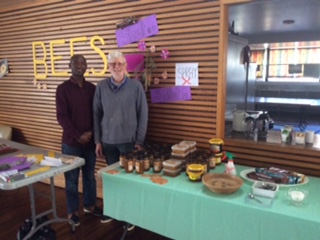Inspired by a climate change TV show, Drowning in Plastic, the Campbelltown Uniting Church community decided to take some action. At Insights we had the opportunity to talk to John Russell, a Board Member and passionate activist who has a complete knowledge of each of the actions the church has taken, from baby steps to having an active role in last year’s school climate strike.

After a Conversation with Jessica Morthorpe, a Uniting Earth Advocate, almost three years ago, they gained some ideas on where to start and started working towards a very clear goal: becoming greener. Their first and very creative idea was to install a solar panel on the roof of the church in the shape of a cross, a sign that has been mention and recognised a lot on social media and among their community. With this, they created a committee called the Sustainability Action Group, reporting to the Church Council, with eight members that have been working for the last couple of years and are covering all the possible fronts in which the church can make a difference.
“We can’t change the world, but we can do a little bit towards it”
John Russel, Board Member, Campbelltown Uniting Church.
Campbelltown Uniting Church has undergone simple changes, such as changing the toilet paper to 100 percent recyclable stock and switching to bamboo and sugar cane paper towels. They get these products from Who Gives A Crap; a B-Corp Certified not- for- profit, that does not use trees on any of their products, and donates half of their profits to build toilets for those that don’t have access to one (about 40 percent of the world’s population). They also decided not to use plastic at all, so they do not use plastic/disposable bags, cutlery or plates.
They have recently changed their toilets to dual flush a variation of the flush toilet that uses two buttons or a handle mechanism to flush different amounts of water. They also changed most of their lights to LED, which consume one-third of the power than the old ones and are much brighter. However, there is an issue that goes beyond changing into a more ecofriendly church: how to engage the community? Over time, sharing their commitment to climate action has made the community aware of the key role that they have is this fight for the environment.
The church has a dump bin and council’s recycle bins as well. “It is not easy to make people throw their garbage in the right bin,” says Russell. But now, the congregation recycle their tea bag tags, lids, cables, clothes and used batteries -they have sent over 15.6 kilograms of batteries to be recycled. The church has also limited printing to only strictly necessary: most communication with the community is via email (unless a member doesn’t have a computer).

They have previously held a Bee day, with about 80 people attending, where experts discussed the topic and acknowledged the importance of bees for the environment; they sell their honey and have built beehives.
Russell says they have a lot of plans in their pipeline, including having a water tank, planting a native garden that requires less water and a Plastic Free July Program at the church this year.
This April, Campbelltown Uniting Church will be conferred a Five Leaf Eco Award, a recognition to their commitment and action taken towards the preservation of the environment. For them, this is only an encouragement to keep working.
Angela Cadena












